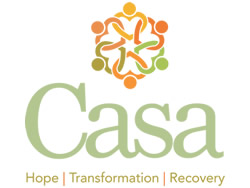Frequently Asked Questions (FAQ)
Here is a selection of questions we get asked.
Why do some people develop an addiction and others do not?
Anyone can become physically dependent on a substance. The type of substance, the amount taken, and frequency of use can create physical dependence. But not everyone who is physically dependent would be described as addicted. The difference lies in the person behavior and emotional expression.
Many of the women who receive treatment at Casa began using substances during their adolescent years. They report having experienced one or more of the following life experiences:
- Early Childhood Trauma
- Adverse Childhood Experiences
- Dysfunctional Family Systems
- Physical, Sexual, and/or Emotional Violence, and Terrorism
What is drug addiction?
Addiction can be described as a chronic, relapsing disorder characterized by compulsive drug seeking use and behavior despite adverse consequences. It is considered a brain disorder, because it involves functional changes to brain circuits involved in reward, stress, and self-control, and those changes may last a long time after a person has stopped taking drugs.
* National Drug Intelligence Center. The economic impact of illicit drug use on American society. Washington, DC: United States Department of Justice, 2011
How effective is treatment?
While each individual in treatment is unique, and no single treatment approach is effective for all women with substance abuse problems, clients have similar goals overall:
- Reducing substance abuse or achieving a substance-free life
- Maximizing multiple aspects of life functioning
- Preventing or reducing the frequency and severity of relapse
- Treatment of other life problems associated with addiction
Recovery is complex and requires a long-term commitment from the client. For women in particular, additional problems can emerge related to parenting, trauma resulting from physical or sexual abuse, or mental illness. A woman's recovery will only be successful to the extent that the other issues which precipitate or relate to the substance abuse problems are also addressed. The path to recovery can be unpredictable and messy, including periods of relapse. Sustained recovery requires ongoing counseling, attendance in self-help and other support groups and accessibility to other resources.
How is the family involved in treatment?
Family group is where loved ones learn about the nature of addiction, their role in the treatment process, and how they can heal from the damages that addiction has caused the family.


